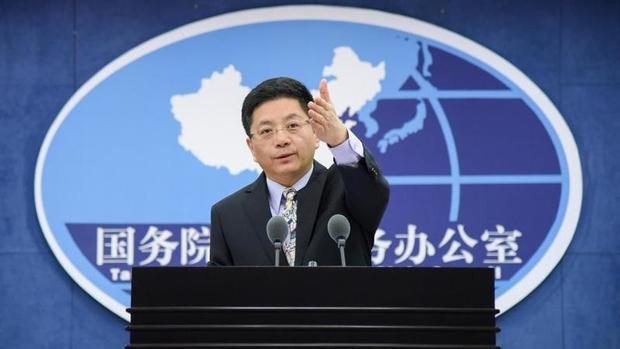 In this Jan 17, 2018 photo, Ma Xiaoguang, spokesperson for the Taiwan Affairs Office of State Council, holds a press conference in Beijing. (CHEN YUHUA / XINHUA)
In this Jan 17, 2018 photo, Ma Xiaoguang, spokesperson for the Taiwan Affairs Office of State Council, holds a press conference in Beijing. (CHEN YUHUA / XINHUA)
National reunification is critical to the rejuvenation of the Chinese nation and cannot be stopped by anyone or any force, a mainland spokesperson said Wednesday.
"Taiwan independence" goes against the tide of the times and it is a path to nowhere, said Ma Xiaoguang, spokesperson for the Taiwan Affairs Office of the State Council
Ma Xiaoguang, a spokesperson for the Taiwan Affairs Office of the State Council, made the remarks when asked to comment on what Tsai Ing-wen, leader of Taiwan's Democratic Progressive Party (DPP) authority, said about cross-Straits relations in her address earlier in the day.
"Taiwan independence" goes against the tide of the times and it is a path to nowhere, Ma said.
"We uphold the fundamental guideline of 'peaceful reunification and one country, two systems,' and we are willing to create vast space for peaceful reunification, but we will definitely not leave any room for separatist activities aimed at 'Taiwan independence' in any form," he said.
"We have a firm will, full confidence and sufficient capabilities to safeguard national sovereignty and territorial integrity, and will never tolerate any attempt to split the country or any interference in China's internal affairs by any external force," Ma said.
The current developments of cross-Straits relations are complex and grave, Ma said, noting that the DPP authority refuses to recognize the 1992 Consensus that embodies the one-China principle, thus unilaterally undermining the political foundation for the peaceful development of cross-Straits relations.
According to Ma, certain Taiwan politicians try to provoke confrontation and obstruct exchanges and cooperation between the mainland and Taiwan, attempting to cut cross-Straits relations geographically and legally.
They have stepped up colluding with external forces to undermine peace across the Taiwan Straits, banking on the COVID-19 epidemic to seek "Taiwan independence," he said.
A tiny fraction of "Taiwan independence" secessionist forces have clamored for the so-called "law amendment" and "referendum" in an attempt to seek "de jure independence," he said.
ALSO READ: How Taiwan walked into the semiconductor trap set by US
All these moves severely harm the wellbeing of Taiwan compatriots and the fundamental interests of the Chinese nation, severely threatening peace and stability across the Taiwan Straits, Ma said
All these moves severely harm the wellbeing of Taiwan compatriots and the fundamental interests of the Chinese nation, severely threatening peace and stability across the Taiwan Straits, Ma said.
"We will continue uniting Taiwan compatriots, work together to promote cross-Straits exchanges and cooperation, enhance the affinity of compatriots on both sides of the Straits, and deepen integrated development of the two sides," Ma said. "We actively support Taiwan businesspeople and enterprises in overcoming difficulties and resuming work and production, and help Taiwan compatriots have more development opportunities and a greater sense of fulfillment on the mainland."
The mainland is willing to, on the common political foundation of adhering to the 1992 Consensus and opposing "Taiwan independence," strengthen exchanges with all political parties, groups and individuals in Taiwan, continue carrying out dialogues and consultations on cross-Straits relations and the future of the Chinese nation, and strive for the peaceful development of cross-Straits relations, peaceful reunification of the motherland and the great rejuvenation of the Chinese nation.
READ MORE: WHA's decision on Taiwan underscores one-China principle
Tsai took office in Taipei and started her second term as Taiwan's leader Wednesday.


